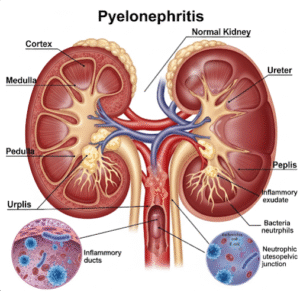Overview
Cough is a common reflex action that helps clear the airways of mucus, irritants, or foreign particles. It can be acute, lasting a few days, or chronic, persisting for weeks or months, and may indicate respiratory infections, allergies, or underlying medical conditions. In Korea, hospitals and clinics provide advanced diagnostics, medical treatments, and preventive care to manage cough effectively and identify any serious underlying causes.
Key Facts
▶ Prevalence: Cough is one of the most common symptoms worldwide and affects all age groups.
▶ Types: Acute (<3 weeks), subacute (3–8 weeks), and chronic (>8 weeks).
▶ Causes: Infections, allergies, asthma, gastroesophageal reflux, or chronic lung conditions.
▶ Associated Symptoms: Sore throat, fever, shortness of breath, chest pain, or wheezing.
▶ Treatment Options in Korea: Medications, inhalers, physiotherapy, and lifestyle interventions.
What is Cough?
Cough is the body’s protective reflex to clear the throat and airways from irritants, secretions, or foreign objects.
▶ Acute Cough: Usually caused by viral infections, colds, or flu.
▶ Chronic Cough: Persists longer than 8 weeks; often associated with asthma, postnasal drip, or chronic bronchitis.
▶ Dry Cough: Non-productive, may result from irritation, allergy, or viral infections.
▶ Productive Cough: Produces mucus or phlegm, often linked to infections or chronic lung disease.
Note: Identifying the type and duration of cough is critical for proper diagnosis and treatment.
What Symptoms Are Related to Cough?
▶ Throat Irritation or Tickling: Often triggers the cough reflex.
▶ Phlegm or Mucus Production: May vary in color depending on cause.
▶ Sore Throat: Due to repeated coughing.
▶ Chest Pain or Tightness: Resulting from prolonged coughing.
▶ Shortness of Breath: In severe or chronic conditions.
▶ Fever or Malaise: May accompany infectious causes.
▶ Wheezing or Noisy Breathing: Indicates airway obstruction or asthma.
▶ Fatigue: Persistent coughing can lead to exhaustion.
What Causes / Possible Causes
Cough can be triggered by infections, chronic diseases, environmental factors, or systemic conditions:
▶ Respiratory Infections: Viral, bacterial, or fungal infections affecting the lungs or throat.
▶ Allergies: Pollen, dust, mold, or pet dander triggering postnasal drip.
▶ Asthma: Chronic airway inflammation causing wheezing and cough.
▶ Gastroesophageal Reflux Disease (GERD): Acid reflux irritating the throat.
▶ Chronic Obstructive Pulmonary Disease (COPD): Emphysema or chronic bronchitis.
▶ Smoking or Environmental Irritants: Tobacco smoke, pollution, or chemicals.
▶ Medications: ACE inhibitors and other drugs can induce chronic cough.
▶ Serious Conditions: Lung cancer, tuberculosis, or heart failure may present with chronic cough.
Note: Persistent or worsening cough requires evaluation to rule out serious underlying conditions.
When Should I See a Doctor?
▶ Cough Lasting More Than 3 Weeks: May indicate chronic conditions.
▶ Severe or Worsening Symptoms: Shortness of breath, chest pain, or high fever.
▶ Coughing Up Blood: Requires immediate medical attention.
▶ Nighttime Cough: Persistent cough disrupting sleep.
▶ Unexplained Weight Loss or Fatigue: Could indicate systemic illness.
▶ Exposure to Risk Factors: Smoking, occupational hazards, or infectious contacts.
▶ Children or Elderly: Persistent cough may lead to complications like dehydration or secondary infections.
▶ History of Chronic Illness: Asthma, COPD, or immunocompromised conditions.
Tip: In Korea, pulmonologists and ENT specialists provide comprehensive evaluation and treatment for cough, ensuring accurate diagnosis and management.
Care and Treatment
Management depends on underlying cause, type, and severity of cough:
▶ Hydration: Drinking plenty of fluids to thin mucus.
▶ Humidified Air: Using humidifiers to soothe irritated airways.
▶ Cough Suppressants or Expectorants: Medications to reduce cough or aid mucus clearance.
▶ Inhalers or Nebulizers: For asthma or chronic lung disease.
▶ Antibiotics or Antivirals: When bacterial or viral infections are diagnosed.
▶ Allergy Management: Antihistamines or avoidance strategies for triggers.
▶ Lifestyle Changes: Smoking cessation, avoiding pollutants, and improving indoor air quality.
▶ Monitoring: Tracking cough duration, triggers, and response to treatment.
Treatment Options in Korea
Medical Evaluation:
▶ Pulmonology Consultation: Assessment of lungs and airways.
▶ ENT Examination: Evaluation of throat, nasal passages, and sinuses.
▶ Imaging Studies: Chest X-ray or CT scan for structural or infectious causes.
▶ Pulmonary Function Tests: Assess lung capacity and airway obstruction.
▶ Laboratory Tests: Blood work, sputum culture, or allergy testing.
Advanced Therapies:
▶ Targeted Medications: Inhaled corticosteroids, bronchodilators, or immunotherapy for allergies and asthma.
▶ Physiotherapy & Breathing Exercises: To improve lung function and clear secretions.
▶ Endoscopic Procedures: Rarely needed for structural issues or severe chronic cough.
▶ Lifestyle and Environmental Interventions: Reducing exposure to triggers and irritants.
Rehabilitation & Support:
▶ Patient Education: Instruction on inhaler use, medication adherence, and lifestyle modifications.
▶ Follow-Up Care: Monitoring response to treatment and preventing recurrence.
▶ Specialist Clinics: Korean hospitals provide integrated care with pulmonology, ENT, and allergy specialists.
Outcome: With proper evaluation and treatment in Korea, cough can be effectively managed, underlying causes treated, and complications such as infections, asthma exacerbations, or chronic airway damage prevented.













